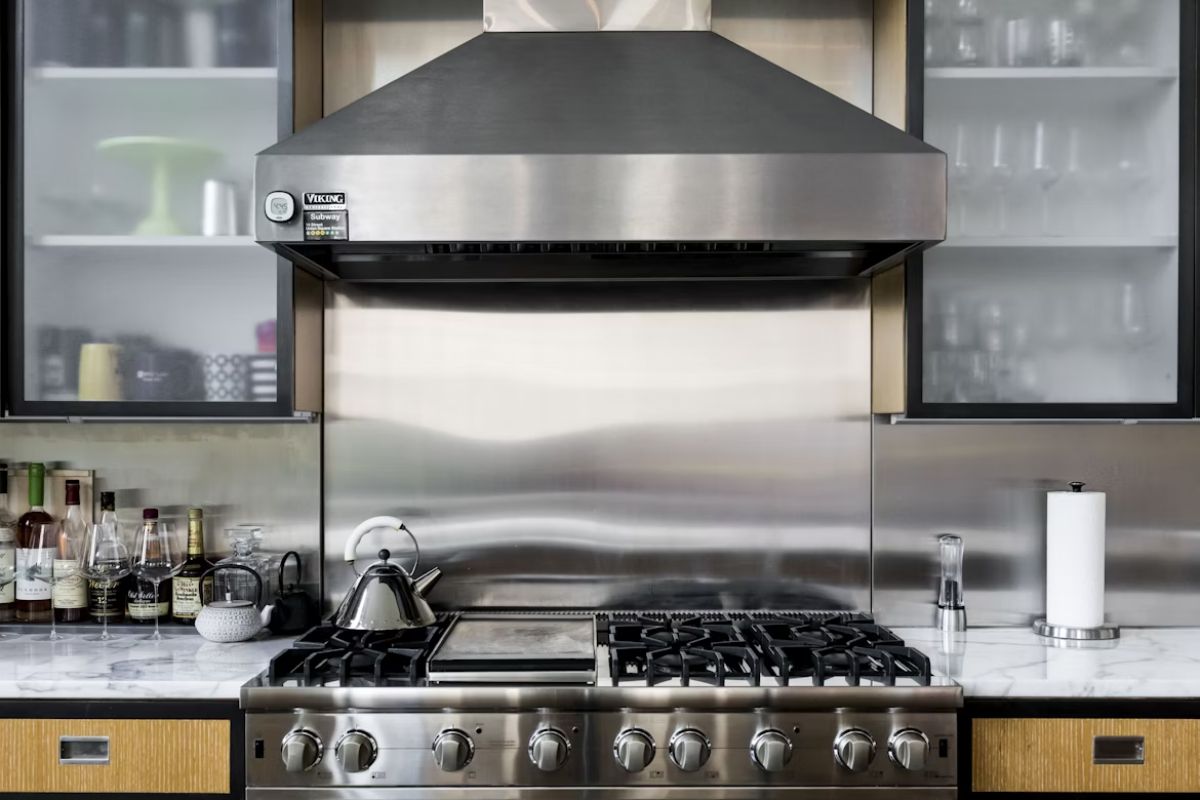Is your fridge on strike? Is your washing machine throwing a tantrum? Fear not, fellow homeowner! This essential guide is your weapon against common appliance woes.
We’ll equip you with the knowledge to troubleshoot like a pro, saving you time and money and reducing the frustration of a silent kitchen or a laundry room overflowing with unwashed clothes. So, grab your screwdriver, and let’s get those appliances back in tip-top shape.
Washing Machine
A washing machine that emits a foul odor is the enemy of clean laundry. Don’t worry. Here’s a quick fix: pour two cups of vinegar, add half of the baking soda into the drum, and run a hot water cycle. This powerful combo will neutralize the odor and make your machine smell fresh.
Front-loading washers are particularly prone to odor issues. To prevent future odors, simply leave the washer door open between washes. This allows moisture to escape and prevents musty smells from developing.
The front-load washer’s design can also trap moisture, a breeding ground for mold and mildew. The good news is you have options. While bleach, mildew remover, vinegar, or baking soda can all tackle existing mold, the key is prevention.
Here’s how to keep your front-load washer smelling fresh and mold-free:
- Let it breathe: After every wash, open the washer door to allow moisture to escape.
- Regular sanitizing: Run a hot water sanitizing cycle with a cleaning agent like vinegar or a commercial washer cleaner to kill mold spores lurking in the machine.
- Tackling existing mold: If you already see mold, don’t panic. Choose your cleaning weapon – bleach, mildew remover, vinegar, or baking soda – and follow the instructions for a deep clean.
Refrigerator
Is your fridge not functioning as intended? Don’t worry, you’re not alone. Fridges, while seemingly simple, are complex machines, and like any appliance, they’re prone to occasional hiccups.
Here’s a breakdown of the most common refrigerator problems and how to tackle them yourself or when to call in a pro:
Top fridge freezes
The culprit could be a faulty control panel or the thermostat that regulates temperature. A malfunctioning control panel can send incorrect signals to other fridge components, while a defective thermostat might not correctly sense the fridge’s internal temperature.
A repair technician is likely needed for control panel woes. However, a dirty condenser coil (those black spirals in the back) can sometimes trick the thermostat. Unplug your fridge, pull it out, and gently vacuum the coils to clear dust bunnies. If this quick fix doesn’t work, call a pro.
Lukewarm fridge blues
This could be due to a few things: a lack of air circulation (dirty coils again), a blocked drain, or even a broken compressor (the heart of your fridge). The compressor circulates refrigerant, which absorbs heat from the fridge cavity. If it’s malfunctioning, your fridge won’t be able to maintain a cool temperature.
Try cleaning the coil. Check for a clogged drain (usually behind the crisper drawers) if that doesn’t work. A blocked drain can prevent proper cooling by causing ice buildup, restricting airflow. If these simple solutions fail, you might have a compressor issue requiring a professional.
No ice or water
A faulty icemaker or a water supply issue could cause this. Check for clogged filters and consult your manual for troubleshooting the icemaker itself. Modern icemakers are often complex and may not be repairable — a replacement might be necessary.
Ice buildup
Defrosting problems or a faulty evaporator fan motor (which circulates cool air) could be the culprit. Check your defrost settings and clean the condenser coils for better air circulation. A clogged drain can also contribute to ice buildup.
Icemaker headaches
These are common because most fridges have them nowadays. Unfortunately, many icemakers are not built for repair and require replacement, adding to the repair cost.
Compressor woes
Replacing a compressor is expensive due to federal regulations on refrigerant handling. It’s best left to a qualified technician.
For complex issues or anything beyond your comfort zone, it’s always best to call a qualified appliance repair service provider to relieve frustration.
Work with a maintenance specialist who recommends original equipment manufacturer (OEM) parts. These are high-quality parts that ensure your appliances work in their best form.
Suppose you have a Kenmore fridge that needs repair and find out its part needs replacement. A discerning appliance specialist would recommend a Sears Kenmore refrigerator part instead of its cheaper counterpart. In that case, your fridge will continue to work seamlessly.
Ranges
Many common oven problems have simple solutions you can tackle yourself. Here are the primary concerns of homeowners:
Ignition system
This is the spark maker in gas ranges. It might be dirty if you hear it clicking, but no flame appears. Food residue or grease can block the spark. Grab warm, soapy water and gently scrub the ignition components (refer to your manual for location).
Burners
Clogged burners are another common culprit of weak flames on gas ranges. Food scraps and grease can build up over time. Clean the burner caps with warm, soapy water, and clear any holes that allow gas flow.
For these issues, a little cleaning goes a long way.
If cleaning doesn’t solve the problem, or if you’re not comfortable tinkering with your oven, it’s time to call in a professional. Here are some issues that require a repair person’s expertise:
Faulty oven bake element
This is the heating element for electric ovens. If your food doesn’t cook properly, this element might need to be replaced.
Oven temperature sensor
This regulates the oven temperature in both gas and electric models. A malfunctioning sensor can lead to uneven cooking or incorrect temperatures.
Dishwasher
Mountains of dirty dishes can put a damper on anyone’s day. But before you resign yourself to handwashing forever, take a deep breath. Many dishwasher problems have simple fixes you can try yourself. Here’s a breakdown of the most common dishwasher complaints and how to tackle them:
Cleaning catastrophes
Is your dishwasher leaving your dishes less than sparkling? The culprit could be:
- Clogged spray arm: Food particles can get lodged in the holes of the spray arm, hindering its ability to clean dishes thoroughly. Check the spray arm for clogs and gently clean them with a toothpick.
- Dirty filter: Dishwasher filters trap food scraps to prevent them from redepositing on your dishes. A clogged filter can hinder water flow and reduce cleaning power. Clean or replace the washer filter according to your manual.
Not-so-dry dishes
Damp dishes? Here are a couple of possibilities:
- Overloading: If you cram too many dishes into the dishwasher, there must be more space for proper airflow and drying. Try using the dishwasher rack space efficiently and avoid stacking dishes on top of each other.
- Faulty heating element: A heating element helps dry dishes in some models. If this element malfunctions, your dishes may come out damp. This is a repair job for a professional.
Drainage dilemmas
Is dirty water pooling in your dishwasher? It could be a clogged drain hose. Food scraps can get stuck in the drain hose, preventing water from draining correctly. Consult your manual for instructions on cleaning the drain hose.
If cleaning doesn’t solve the problem, or if you encounter more complex issues like a broken control panel or water leaking, it’s best to call a professional appliance repair person.
Note that dishwasher problems often creep up slowly. You might not notice a decline in cleaning performance right away. Be observant and promptly address strange noises (like grinding) or leaks to avoid more severe problems.
The good news? Many dishwasher woes can be fixed with little troubleshooting. Following these tips, you can keep your dishwasher running smoothly and your dishes sparkling clean.
Over-the-range (OTR) microwaves
They are workhorses in the kitchen, saving us time and space. But even these mighty appliances can run into problems. Don’t fret! Here’s a guide to common OTR microwave issues and how to tackle them yourself or when to call in a professional.
Button blues
Are those buttons not responding? The control panel might be on the fritz. While a malfunctioning control panel usually requires a repair person, a simple cleaning might help. Wipe the buttons using a damp cloth and see if that solves the problem.
Not-so-silent heating
Is your microwave sounding like a jet engine? This could be due to a malfunctioning fan or a buildup of dust and debris around the fan. Consult your manual for instructions on cleaning the fan area.
Lukewarm leftovers
Is your microwave not heating food evenly or at all? The culprit could be a dirty magnetron (the microwave generator) or a faulty door not sealing properly. A dirty magnetron is a job for a professional, but you can check the door seal for damage and ensure it’s closing securely.
Turntable troubles
A slow or non-spinning turntable can lead to unevenly heated food. Ensure the turntable is clean and debris-free, and check if anything is blocking its rotation mechanism.
Exhausting issues
The grease filter might be clogged. Clean or replace it according to your owner’s manual.
Remember, a damaged microwave door is a safety hazard. If you suspect a door latch or seal issue, call a professional repair person to avoid potential exposure to harmful microwaves.
Experts emphasize the importance of a properly functioning microwave door. If you have concerns about your door, err on the side of caution. Seek professional help.
Appliance Regular Upkeep
Appliances are the workhorses of our homes, keeping our food fresh, our clothes clean, and our lives running smoothly. But like any workhorse, they need a little TLC to keep them running their best. Here are some easy appliance maintenance tips to extend the life of your trusty machines:
Cleaning champions
Make regular cleaning a habit! Dirt and debris can get stuck on coils, filters, seals, and vents, hindering performance and shortening lifespan. Focus on these areas during your cleaning routine — consult your appliance manual for specific instructions.
Read the manual
Those user manuals aren’t just there to collect dust. Following the manufacturer’s recommendations for proper use and care can prevent misuse and extend the life of your appliance.
Avoid overloading your washer or using your oven for unintended purposes — follow the guidelines for optimal performance.

Being Proactive Now Goes A Long Way
Proactive steps like troubleshooting, maintenance, and professional repair services have enormous benefits.
Well-maintained appliances run efficiently, saving you money on energy bills. Proper maintenance can also extend the lifespan of your appliance, saving you the cost of replacements.
Knowing your appliances are in good shape reduces stress and ensures a smooth-running home. Remember: A little effort now can save you time, money, and frustration in the long run.













